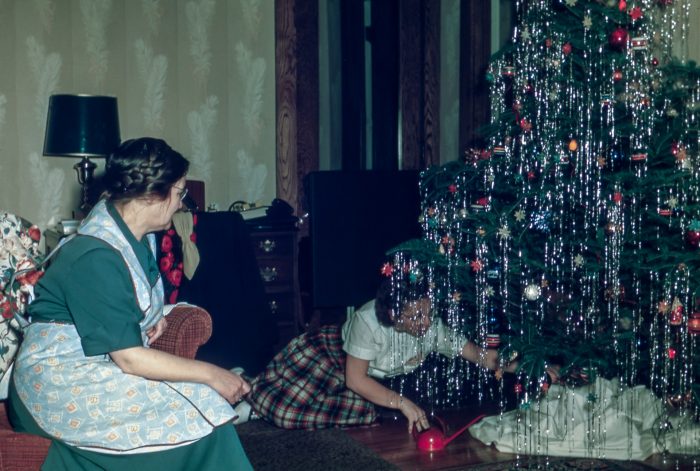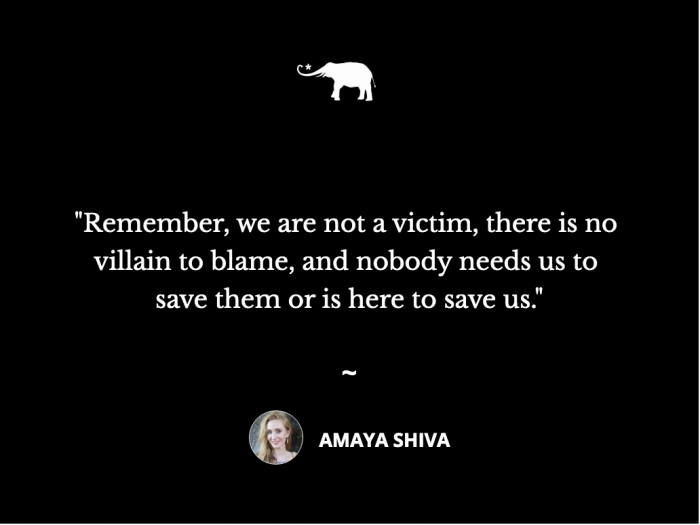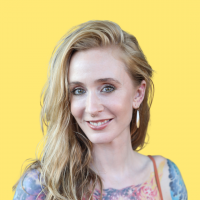Ah, holidays.
I always get excited about going home to see my family—romantic fantasies of blissful dinners with everyone present, sharing stories, eating too much, and then watching “The Christmas Story” for the umpteenth time while it plays nonstop for 24 hours.
And then you get home and reality kicks in: the sweet sounds of your brother arguing with Dad over whose fault it is we are still in a pandemic and what to do about it; your mom asking you a million questions about coworkers she has never even met; then the discussion about why your sister hasn’t been to Christmas in five years.
Ram Dass has a famous quote that says, “If you think you’re enlightened, spend a week with your family.”
As a personal freedom coach and spiritual aspirant who has been immersed in the world of personal development for over 13 years, this truth has smacked me in the face a number of times.
I remember the first time I went home after my initial forays into my own awareness and being hit with the realization of just how much my parents’ patterning had shaped my outlook on life.
I was in the beginning phases of conscious interaction and radical self-responsibility—aka I was in a self-righteous stage where I thought my newfound levels of “consciousness” were something I needed to impose on others. That it was up to me to “fix” my dad and get him motivated, that it was my job to “show” my mom wealth is a tool, when the truth is I was missing the point.
But that’s hindsight, and while in the mix, I fell straight back into the hole of the drama triangle. I had spent much of my life stuck in victim/villain because of their patterns (so I told myself), and by golly, now it was my turn to rescue them all from their conditioning (cue snapping my cape around my neck)!
Guess what happens when you “tell” people what you’ve learned while in the middle of doing some sh*t they have been doing for years and aren’t in a relaxed state to receive? Absolutely f*cking nothing, other than you might piss them off and turn them off from listening to what you have to share in the future.
Lesson learned here? Timing is everything, and words are cheap. It’s how you actually show up that impresses people.
The classical texts of Ayurveda teach us that we choose our parents based on the quality of our mind. Translation, we chose our parents because there was resonance there due to similarity in patterning.
Some of us choose relationships that teach us how not to be, others are more stable and secure for us to emulate, but whatever we chose, we chose—which may or may not be helpful while we’re in the thick of it, but perhaps this can be our opportunity to stop being upset with our familial karma and start getting curious.
Why did I choose my parents?
What obstacles have they had to overcome?
How have their patterns served to “protect” them?
How have these obstacles contributed to my own outlook on life?
What have I had the blessing to overcome as a result?
And even more important is to acknowledge that our family members have trauma and tribulations too. It’s easy to make someone’s bullsh*t about us and how it impacts our experience—there is a better way. One of the quickest roads to compassion for ourselves is deep, loving compassion for our parents and family members.
So what can you do instead of pointing out the flaws in your family members’ mindsets and trying to fix them?
Here are my top tools I teach my clients to keep us sane, loving, and receptive while home so we can start to embody our conscious journey instead of acting like a pretentious “woke joke.”
1. We can’t save people from the lessons they came here to learn—so love them for who they are right now instead of who you think they should be. Easier said than done, right? We can quickly fall into the trap of wanting to help other people when their patterns are bright as day from our perspective, but here is the truth: we can only lead people who want to be led.
If our family member(s) don’t want that from us, respect it, and use your newfound skills to love all, no matter where they are in their own development. After all, if something another does really triggers you, it’s usually because you yourself do it, or don’t and wish you did. Real talk!
2. Love people for exactly who and where they are. Our family is not our “project”; our family is here to show us our blind spots as much as we are here to show them theirs. And the best way to make people receptive to that is through embodying our work—not talking about it.
When we love other people for who they are right now, for their mistakes and quirks, we heal ourselves in the process. Nobody is perfect; I mean nobody! Actively loving imperfections is a miracle balm for promoting self-love, building loving relationships, and creating intimacy. Try it on.
3. Let people have their viewpoints. There are some things you may never agree on with family members because they are stuck in a perspective—and maybe you are too. We are all the blind men and the elephant, limited by our own viewpoints and conditioning.
Allow people to have their opinions (remember lesson one), and for f*ck’s sake, let go of the need to be right. People are wrong all the time. You are people. We are people. So let it go. Breathe. And focus on what you came here to do—be in community with the people you chose to journey with in this lifetime.
4. Take space when you need it. This is so important and something I remind my clients of when they are worried about family overwhelm. Don’t ditch your daily practices now—you need them more than ever.
If that means getting up at 6 a.m. just so we can have 30 minutes of quiet before Mom and Dad (or whoever we are with as chosen family) gets up, or saying no to something even if our family villainies us, then so be it. We are not responsible for how other people feel, but we are responsible for our own behaviour. So do you, boo. Selfish and selfless both begin with self. Remember that.
5. Forgive. Forgive yourself. Forgive your parents. Forgive your circumstances. Forgive the neglect. Forgive the overbearing sheltering. Forgive the false assumptions about you and your life. Forgive and lead with love. And if that means creating our own rules about how we show up, for how long, and so on, so be it. Life is short. Live love. Love life. Do the best you can, and let God do the rest.
Remember, we are not victims, there is no villain to blame, and nobody needs us to save them or is here to save us. When we hold the truth that every person is perfect, whole, complete, and not finished yet, including ourselves, we open up space for true healing and acceptance to occur.
This journey is not about fixing others or ourselves. This work is about accepting and integrating all parts of us, about bringing them into the fold so that they no longer have to cry out for our attention.
Each member of our family represents something we get to heal, including our chosen family. I commend you for your commitment to growth and am also here to remind you that you don’t have to do it alone.
What makes me a great coach is that I allow myself to be supported by my coaches and community. It also straight-up keeps me sane.
Merry Christmas, Happy New Year, and blessings to all!
~













Read 7 comments and reply